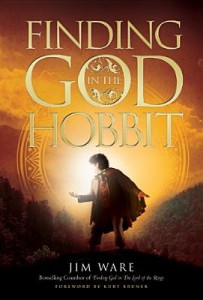 The book up for review this month is Jim Ware’s Finding God in the Hobbit.
The book up for review this month is Jim Ware’s Finding God in the Hobbit.
Kurt Bruner writes the introduction, and muses upon the sadness of a childhood that didn’t involve hobbits when it could have. I have to agree. As an only child of a single mother, such fantasy books did not populate my bookshelves (nor the Narnian Chronicles), and as an adult, I can appreciate with sweetness the absence, and what it might have meant for me further down the road to have had these stories always in the back of my mind.
Professor Tolkien knows good and evil, and he infuses them into his works, and does so in such a masterfully un-proselytizing way as to make this small glimpse of the truth open to any and all.
Jim Ware’s book, Finding God in the Hobbit, is the follow-up to his Finding God in the Lord of the Rings, and Finding God in the Land of Narnia. NB: Both of those earlier books are available for free on your Kindle or Kindle-reading device (which, if you have a computer, you have one!). I’ve not fully read either of his early books yet, but they most certainly will be added to my Kindle docket!
I’ve noticed that most books that purport to be about Tolkien cannot but help drag in C. S. Lewis all over the place, and often other, like George MacDonald. Ware does not buck this tradition, but in fact opens with the story of Lewis’s finding of a book by MacDonald, which “baptized” Lewis’s imagination, and then contrasts this with his own discovery of The Hobbit. Though Ware was already “a believer (although a young believer),” nevertheless, he credits J. R. R. Tolkien’s The Hobbit with showing him a world both “completely familiar . . . and yet entirely strange,” which itself echoes—and thus permits me to indulge—G. K. Chesterton’s analogy of himself finding his own faith, like a man who set sail to find a distant land, and yet found his own home, which he laid out in his book, Orthodoxy (also a freebie on Kindle!).
Ware’s book is meant to draw out the Christian themes of The Hobbit, and he does a fair job. Each chapter is short and pithy, beginning with about a 1 1/2 page summation of a section of The Hobbit, followed by about 2 1/2 pages of exposition, including parallels to various scripture passages. Each chapter ends with a one-sentence rejoinder: “Be sure your dream will find you out!” or “Enjoy the treasures of this world, but hold them lightly.”
Where Finding God in the Hobbit falters, as do many books of this ilk, is in the fact that Tolkien wasn’t merely “Christian,” but devoutly Catholic. Catholicism infuses his stories with what Ware marvels as an ability to stir “our love of material things.” Not that any of his works are exercises in apologetical materialism! But it’s because Catholicism embraces the material world as being inherently good, and has done so for 2000 years. There is real beauty and nobility in it, which is why her Creator deemed it a good act to become one with her.
How Catholic was Tolkien? Consider what he wrote to his son in a letter:
“Out of the darkness of my life, so much frustrated, I put before you the one great thing to love on earth: the Blessed Sacrament. . . There you will find romance, glory, honour, fidelity, and the true way of all your loves on earth, and more than that: Death. By the divine paradox, that which ends life, and demands the surrender of all, and yet by the taste -or foretaste- of which alone can what you seek in your earthly relationships (love, faithfulness, joy) be maintained, or take on that complexion of reality, of eternal endurance, which every man’s heart desires.
The only cure for sagging or fainting faith is Communion. Though always Itself, perfect and complete and inviolate, the Blessed Sacrament does not operate completely and once for all in any of us. Like the act of Faith it must be continuous and grow by exercise. Frequency is of the highest effect. Seven times a week is more nourishing than seven times at intervals.
Also I can recommend this as an exercise (alas! only too easy to find opportunity for): make your communion in circumstances that affront your taste. Choose a snuffling or gabbling priest or a proud and vulgar friar; and a church full of the usual bourgeois crowd, ill-behaved children – from those who yell to those products of Catholic schools who the moment the tabernacle is opened sit back and yawn – open necked and dirty youths, women in trousers and often with hair both unkempt and uncovered. Go to communion with them (and pray for them). It will be just the same (or better than that) as a mass said beautifully by a visibly holy man, and shared by a few devout and decorous people. It could not be worse than the mess of the feeding of the Five Thousand – after which our Lord propounded the feeding that was to come.”
Ware’s book, like so many written from a Protestant perspective, simply cannot fully fathom what Tolkien was up to (or even Lewis, who was about 1/2 a step from being Catholic, and were he alive today, I all but guarantee he’d have converted.) To get a fuller appreciation of the entire worldview that informs—and forms—Tolkien’s stories, I’d recommend a book like The Philosophy Tolkien by Peter Kreeft (not a freebie on Kindle—but who cares! Buy a copy!)
Nevertheless, Finding God in the Hobbit is an enjoyable meditation upon this small but enjoyable glimpse into the world of Middle Earth. I give it 3 1/2 stars out of 5.